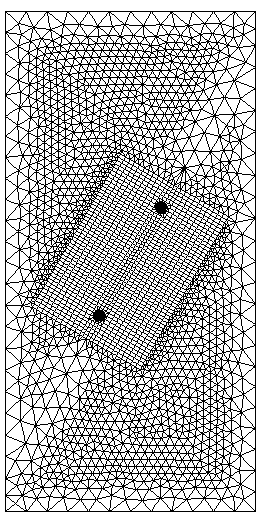3. Modeling A#
3.1. Characteristics of modeling#
The various models are identical except for the slope of the crack.

Full mesh for one angle \(\beta =60°\)
Zoom on the crack point
The radius is \(7.5E-5m\).
There are four crowns defined by command CALC_G:
crown 1: \(\mathrm{Rinf}=0.\) |
|
crown 2: \(\mathrm{Rinf}=1.875E-\mathrm{5m}\) |
|
crown 3: \(\mathrm{Rinf}=3.750E-\mathrm{5m}\) |
|
crown 4: \(\mathrm{Rinf}=5.625E-\mathrm{5m}\) |
|
The direction of propagation is defined by: \(\mathrm{cos}\theta ,\mathrm{sin}\theta\)
3.2. Characteristics of the mesh#
The mesh consists of 10676 nodes and 4584 elements, including 1392 QUA8 elements and 3168 TRI6 elements.
3.3. Features tested#
The calculation of \({K}_{I}\) and \({K}_{\mathrm{II}}\) is not valid for a bimaterial: option K cannot be used and only the calculation of the energy return rate is possible.
3.4. Tested sizes and results#
3.4.1. Tested values#
Identification |
Reference |
Aster |
% difference |
Left end, \(\theta =15°\) |
|||
\(G\), crown 1 |
9.67362E+1 |
9.2428E+1 |
4.45 |
\(G\), crown 2 |
9.67362E+1 |
9.6392E+1 |
0.356 |
\(G\), crown 3 |
9.67362E+1 |
9.6417E+1 |
0.330 |
\(G\), crown 4 |
9.67362E+1 |
9.6421E+1 |
0.326 |
\({K}_{I}\) |
5,6694E+6 |
||
\({K}_{\mathrm{II}}\) |
2,4852E+6 |
||
Right end, \(\theta =15°\) |
|||
\(G\), crown 1 |
1.0125E+2 |
9.6763E+1 |
4.33 |
\(G\), crown 2 |
1.0125E+2 |
1.0093E+2 |
0.315 |
\(G\), crown 3 |
1.0125E+2 |
1.0095E+2 |
0.295 |
\(G\), crown 4 |
1.0125E+2 |
1.0095E+2 |
0.291 |
\({K}_{I}\) |
6,3145E+6 |
||
\({K}_{\mathrm{II}}\) |
4,8309E+5 |
3.4.2. notes#
To obtain the \(G\) on the bottom of the crack, we calculate the energy release rate using the relationship between \(G\) and the \({K}_{j}\) [bib3]:
\(\begin{array}{c}{\kappa }_{1}\mathrm{=}{\kappa }_{2}\mathrm{=}2.076923\\ {\mu }_{1}\mathrm{=}7.6923E+11\\ {\mu }_{2}\mathrm{=}7.6923E+10\\ \alpha \mathrm{=}\mathrm{-}9.37742E\mathrm{-}2\\ \beta \mathrm{=}2.524488E\mathrm{-}12\\ G\mathrm{=}\beta ({K}_{I}^{2}+{K}_{\mathit{II}}^{2})\end{array}\)